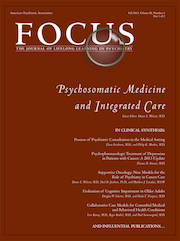Supportive Oncology: New Models for the Role of Psychiatry in Cancer Care
Abstract
The last 40 years have seen dramatic advances in the scientific understanding of the mechanisms underlying the clinical behavior of cancer and in the effectiveness of cancer prevention, diagnosis, staging, and treatments. Cancer care can now often be truly individualized, based on measurement of tumor biomarkers, advanced imaging technology, and use of targeted anticancer treatments. Treatment advances have resulted in the creation of large numbers of cancer survivors, and to the recognition that cancer is now often a chronic, rather than acutely life-threatening, illness. Evolution of our scientific and clinical understanding of the human dimensions of cancer and cancer care can be encapsulated in the progression of descriptive terms from psycho-oncology, to psychosocial oncology, to supportive oncology. Now a broad range of cancer patient and family services are recognized as being important to providing comprehensive patient-centered cancer care as one component of the patient’s overall care delivery experience. This paper reviews information on psychiatric aspects of cancer and cancer treatment, the role of psychiatry and behavioral health services, best practice organizational models for provision of integrated supportive oncology services within the hospital cancer program environment, and the increasing importance of supportive oncology national quality of care standards.



